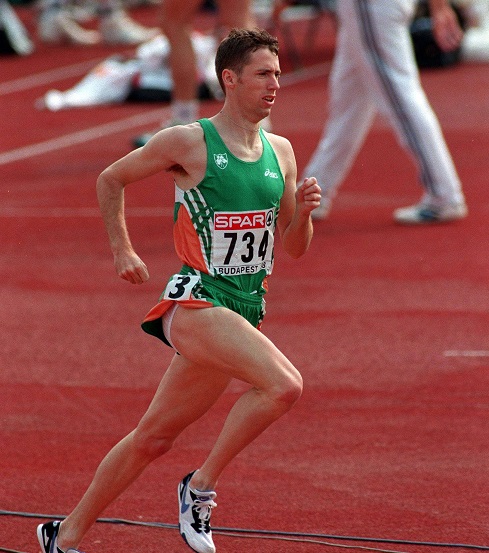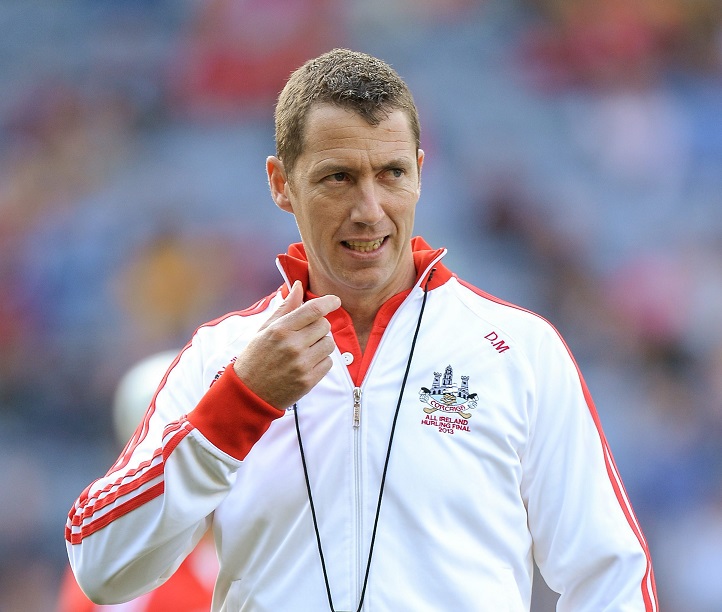
David Matthews from Leixlip at the Sydney Olympics in 2000. Picture: Sportsfile
David Matthews approached the 800m start line, took a deep breath, and attempted to settle into lane eight. He tried to focus on the job at hand but even amongst the sea of 80,000 voices in Atlanta, he could still pick out the occasional Irish call.
“Twenty rows back you might hear a ‘come on David’ or a ‘go on Ireland’ and it’s like being lost in the crowd. I wanted to leave the track and go sit up beside them to watch the race. I got into the semi-final, but it was the same night Sonia was running the final of her 5,000m. The stadium was packed, I’d say every Irish-American was there that night,” David said.
Fear factor
“You’re sort of afraid, nervous around the uncertainty of what might happen, and you feel weak to be perfectly honest. You feel like this even though you’re in the shape of your life and at the peak of your sport at the Olympic Games.”
As David was preparing himself for the biggest race of his life, he noticed the stadium announcer begin to introduce the competitors.
“I’ll never forget as the camera went through the lanes you look up at the big screen to see yourself, and you’re thinking ‘God ,what the hell am I doing here?’” David recalled.
“You get ready, and you hear the crackling of the electronic gun behind you and away you go. As you’re running your brain is constantly playing games with you and it feels like your mind is running a hundred programs at the same time.”
David finished fourth and missed out on qualification by one spot. However, at 22, he felt as if there was still plenty of time for him to realise his Olympic ambitions.
Eleven months prior, in September 1995, the Leixlip man broke Marcus O’Sullivan’s 11-year-old 800m record in Rieti, Italy. He became only the fifth man to hold that record in Irish athletics history. The other record bearers included Ronnie Delaney, Noel Carroll, Niall O’Shaughnessy, and Marcus O’Sullivan.
David ran a 1:44.82, setting a new Irish record, and announcing his entrance into the athletics scene. This achievement came just two years after entering senior competition.
David’s attitude is that he was “just minding the record for the next person” — and the 26-year-old mark was broken by Mark English, who ran a 1:44.71 in Castellón, Spain, last summer, to qualify for the Tokyo Olympics. David congratulated Mark on Twitter that evening.
Training camp
After the delight of breaking the Irish record himself back in 1995, David’s attention turned to the aforementioned 1996 Olympic Games. In preparation, David went to Sonia O’Sullivan’s training camp in Australia to join up with other Olympic hopefuls and get ready for the games.
“I feel as if I overtrained, and it is one of the biggest mistakes you can make as an athlete.
“I lost a lot of weight, I got down to 73kg and at 6ft 2 I was noticeably light. I worked on my aerobic element, but it was to the detriment of my speed,” David explained.

Ireland's David Matthews in action during the men's 800m first round at the European Athletics Championships, Nep Stadium, Budapest, Hungary, in 1998. Picture: Brendan Moran/SPORTSFILE
David was also a part of Team Ireland’s disaster four years later in Sydney where Sonia O’Sullivan was the only member not to come home empty-handed. Irish organisers mishandling of the event had caused a lot of discontent within the camp.
“People speak about Saipan in soccer but it’s all small stuff compared to this. We were given woolly suits for the opening ceremony when it’s 90°F outside, a bobbly pitch would be the least of your worries. We were at a stage then where amateur operations were meeting athletes that were used to professionalism,” David explained.
Despite these disappointments, David still reflects fondly on his Olympic experiences and says he will forever be an advocate for the magic of the games.
“The Olympics is the only truly global event. Some people will say soccer but with track and field there are zero barriers to entry. You don’t need a ball or equipment. It is just a person’s ability to get from one point to another and it’s innate to us all.
“When I was in Atlanta there were 200 countries represented and there is something harmonious about the whole thing. I saw the array of people and flags all competing at one event, it gave me a warm feeling about it all,” David described.
“I would have loved more medals but looking back, I did too much too soon. From the age of 20 to 26 I competed in all available major championships. That is why my career ended at 27. Compare that to Marcus O’Sullivan who was running competitively into his mid-30s.”
In between those Olympic events in 1998, David’s coach Noel Carroll died suddenly. An Olympian in his own right Noel’s death took an emotional and physical toll on David.
“He was my rudder and without him, I struggled to know when I needed to take some time off or miss an event, he would have seen all that,” David explained.
“The science of coaching is there in a textbook, but I genuinely think it’s an art. Noel knew what made me tick. Anyone can plan a training session but it’s how you deliver it and having the ability to spot problems with your athlete, whether they are mental or physical.
“When I lost that, I felt that I had lost a big part of the jigsaw that I was putting together for success.”

David Matthews in his role as a Cork trainer at the GAA Hurling All-Ireland Senior Championship Final replay in 2013. picture: Brendan Moran / SPORTSFILE
When David’s career did come to an end, a fresh desire for team sports had emerged. After battling the track solo all this time, it was time to take to the field with 14 others by his side.
“I started playing Junior A football and well there is absolutely nothing better to bring you crashing back down to earth. But it was a great experience, having that team element, the camaraderie, and engaging with the local area again was incredibly rewarding,” David described.
After initially going into banking following his athletic adventure, David’s involvement in Gaelic games became a more serious when he was brought in as Cork’s senior hurling trainer and running coach under legendary figure Jimmy Barry-Murphy.
“It was a superb experience and in terms of my personal satisfaction it is right up there with my Olympic success and holding Irish records. The planning was so crucial, I knew if I got it wrong in terms of their preparation it would have a detrimental effect on the team’s performance,” David said.
Joy and success
“But the joy I have from that period and that team’s successes is up there with absolutely anything for me, amazing moments. The last game in the old stadium was one of the happiest days of my life. The 2014 Munster final win in Páirc Uí Chaoimh versus Limerick, was an unbelievable experience.”
Jimmy Barry-Murphy remains one of David’s biggest inspirations and they are friends to this day. David was always inspired by the incredible people around him, in athletics the likes of Sonia O’Sullivan and many others who would go on to become teammates of his. But David can still remember the moment clear as day from the man who kicked off the athletics obsession for him at aged nine.
“I remember when Eamonn Coghlan won in 1983 in Helsinki, I can still see him running around that last bend. There was a famous poster made of him that I had on my wall from a non-alcoholic beer called Kaliber, I can still picture all of that. Eamonn was a massive inspiration for me and my entire generation,” David explained.
“That mantel then was taken up by people like Marcus O’Sullivan and Sonia, and as my career progressed, I started training with these guys and becoming friends. All of a sudden, they went from being my heroes to me being my teammates. It wasn’t just the calibre of athlete they were, but the calibre of person they were that was so special and that great energy from them was contagious.”
Subscribe or register today to discover more from DonegalLive.ie
Buy the e-paper of the Donegal Democrat, Donegal People's Press, Donegal Post and Inish Times here for instant access to Donegal's premier news titles.
Keep up with the latest news from Donegal with our daily newsletter featuring the most important stories of the day delivered to your inbox every evening at 5pm.